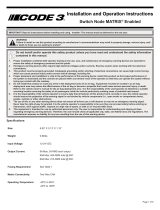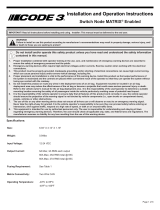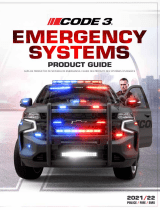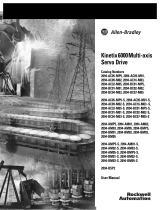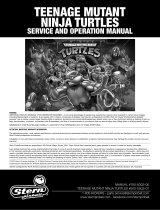Page is loading ...

Page 1 of 8
Installation and Operation Instructions
Switch Node MATRIX® Enabled
IMPORTANT! Read all instructions before installing and using. Installer: This manual must be delivered to the end user.
WARNING!
Failure to install or use this product according to manufacturer’s recommendations may result in property damage, serious injury, and/
or death to those you are seeking to protect!
Do not install and/or operate this safety product unless you have read and understood the safety information
contained in this manual.
1. Proper installation combined with operator training in the use, care, and maintenance of emergency warning devices are essential to
ensure the safety of emergency personnel and the public.
2. Emergency warning devices often require high electrical voltages and/or currents. Exercise caution when working with live electrical
connections.
3. This product must be properly grounded. Inadequate grounding and/or shorting of electrical connections can cause high current arcing,
which can cause personal injury and/or severe vehicle damage, including re.
4. Proper placement and installation is vital to the performance of this warning device. Install this product so that output performance of
the system is maximized and the controls are placed within convenient reach of the operator so that they can operate the system without
losing eye contact with the roadway.
5. Do not install this product or route any wires in the deployment area of an air bag. Equipment mounted or located in an air bag
deployment area may reduce the eectiveness of the air bag or become a projectile that could cause serious personal injury or death.
Refer to the vehicle owner’s manual for the air bag deployment area. It is the responsibility of the user/operator to determine a suitable
mounting location ensuring the safety of all passengers inside the vehicle particularly avoiding areas of potential head impact.
6. It is the responsibility of the vehicle operator to ensure daily that all features of this product work correctly. In use, the vehicle operator
should ensure the projection of the warning signal is not blocked by vehicle components (i.e., open trunks or compartment doors),
people, vehicles or other obstructions.
7. The use of this or any other warning device does not ensure all drivers can or will observe or react to an emergency warning signal.
Never take the right-of-way for granted. It is the vehicle operator’s responsibility to be sure they can proceed safely before entering an
intersection, drive against trac, respond at a high rate of speed, or walk on or around trac lanes.
8. This equipment is intended for use by authorized personnel only. The user is responsible for understanding and obeying all laws
regarding emergency warning devices. Therefore, the user should check all applicable city, state, and federal laws and regulations. The
manufacturer assumes no liability for any loss resulting from the use of this warning device.
Specications:
Size: 6.93” X 3.13” X 1.19”
Weight: 0.84lbs
Input Voltage: 12-24 VDC
Sleep Current: 1.2 mA RMS
Output Current: 5A MAX; 2.5A RMS EACH CHANNEL
60A MAX; 40A RMS TOTAL @ 65°C
40A MAX; 20A RMS TOTAL @ 65°C
Fusing Requirement: See Table 1
Matrix Connectivity: Two Wire CAN
Operating Tempera-
ture:
-40ºC to 85ºC
-40ºF to 185ºF

Page 2 of 8
Carefully remove the product and place it on a at surface. Examine the unit for transit damage and locate all parts. If damage is found or
parts are missing, contact the transit company or Code 3. Do not use damaged or broken parts. Ensure the product voltage is compatible
with the planned installation.
Figure 1
Unpacking and Pre-Installation:
Recommended mounting hardware #8-#10.
Maximuim mounting torque, 35 in-lbs using #10-32 hardware with
ange nut or washer on at surface.
Dierent hardware or mounting will aect max torque limits.
Before proceeding with installation, plan all wiring and cable routing. Mount on at surface using at least 2 points of mounting, and ensure
that wires/power cables are not pulling on product. Do not mount product face down on labels/indicator window. Ensure that no metal edge,
or conductive points are pressing on the potted (bottom) side of the product. Pick a location to mount product that is away from vehicle
exhaust, coolant lines or other items that get hot.
Installation and Mounting:
Figure 2 Figure 3
CAUTION!
When drilling into any vehicle surface, make sure that the
area is free from any electrical wires, fuel lines, vehicle
upholstery, etc. that could be damaged.
Torque to 20 in-lb

Page 3 of 8
Notes:
1. Larger wires and tight connections will provide longer service life for components. For high current wires it is highly recommended
that terminal blocks or soldered connections be used with shrink tubing to protect the connections. Do not use insulation displacement
connectors (e.g., 3M Scotchlock type connectors).
2. Route wiring using grommets and sealant when passing through compartment walls. Minimize the number of splices to reduce voltage
drop. All wiring should conform to the minimum wire size and other recommendations of the manufacturer and be protected from moving
parts and hot surfaces. Looms, grommets, cable ties, and similar installation hardware should be used to anchor and protect all wiring.
3. Fuses or circuit breakers should be located as close to the power takeo points as possible and properly sized to protect the wiring and
devices.
4. Particular attention should be paid to the location and method of making electrical connections and splices to protect these points from
corrosion and loss of conductivity.
5. Ground termination should only be made to substantial chassis components, preferably directly to the vehicle battery.
6. Circuit breakers are very sensitive to high temperatures and will “false trip” when mounted in hot environments or operated close to their
capacity.
Using the appropriate ring terminal, connect a 14 AWG (min.)ground wire from a 12-24 VDC supply to the ground lug of the Switch Node
(torque to 20 in-lb). It is not necessary to use a heavier gauge ground wire because most of the output current from the device does not
return through the ground lug. Then, using the appropriate ring terminal, connect power wire (see Table 1 for size) from the same supply to
the power lug of the Switch Node(torque to 20 in-lb). Install a fast blow, ATC style fuse in-line (see Table 1 for size). Please note that the
fuse holder selected by the installer must also be rated by its manufacturer to meet or exceed the corresponding fuse ampacity
across the operating temperature. See Figure 4 for details.
All Matrix compatible devices must also connect back to a central node, such as the Serial Interface Box or Z3 Serial Siren, to establish serial
communication with the larger network. In this case, the Switch Node utilizes a bare wire, twisted pair. Connect the Yellow and Blue wires
from the output harness to the central node as shown. See Figure 4 for details.
Wiring Instructions:
Please note, all unused output wires from the Switch Node
should be tied o and electrically isolated. This is to prevent
accidental contact with either power or ground.
Figure 4
(See Table 1)
Matrix® enabled
Switch Node BLUE
YELLOW
CENTRAL NODE
PRI-1 SEC-2 B Y
BLACK
RED
CAN_N CAN_P
TABLE 1
Power Wire
(+)
Fuse Rating
(Max.)
Current
(RMS)
Ground Wire
(-)
8 AWG 60 A 45 A 14 AWG
10 AWG 50 A 35 A 14 AWG
12 AWG 40 A 25 A 14 AWG
SWITCH NODE DUAL-WIRE OUTPUTS
BLU/WHT and BLU/BLK YEL/WHT and YEL/BLK
WHT and WHT/BLK BLK/WHT and BLK/YEL
RED/WHT and RED/BLK GRN and GRN/BLK
ORN/WHT and ORN VIO/WHT and VIO
WARNING!
Disconnecting the vehicle brake lamp circuit using any
sirens with relay outputs or switch controllers could
cause vehicle or property damage, serious injury, or even death.
Disabling this circuit is a violation of the Federal Motor Vehicle
Safety Standard for the brake lights. Disconnecting the brake
lights in any way is at your own risk and is not recommended.

Page 4 of 8
Device Functionality:
TABLE 3 - OUTPUT HARNESS
COLOR DESCRIPTION INIDIVIDUAL RATING
BLUE W/ WHITE OUTPUT 1 6A MAX / 3A RMS
BLUE W/ BLACK OUTPUT 2 6A MAX / 3A RMS
WHITE OUTPUT 3 6A MAX / 3A RMS
WHITE W/ BLACK OUTPUT 4 6A MAX / 3A RMS
RED W/ WHITE OUTPUT 5 6A MAX / 3A RMS
RED W/ BLACK OUTPUT 6 6A MAX / 3A RMS
ORANGE W/ WHITE OUTPUT 7 6A MAX / 3A RMS
ORANGE OUTPUT 8 6A MAX / 3A RMS
YELLOW W/ WHITE OUTPUT 9 6A MAX / 3A RMS
YELLOW W/ BLACK OUTPUT 10 6A MAX / 3A RMS
BLACK W/ WHITE OUTPUT 11 6A MAX / 3A RMS
BLACK W/ YELLOW OUTPUT 12 6A MAX / 3A RMS
GREEN OUTPUT 13 6A MAX / 3A RMS
GREEN W/ BLACK OUTPUT 14 6A MAX / 3A RMS
PURPLE W/ WHITE OUTPUT 15 6A MAX / 3A RMS
PURPLE OUTPUT 16 6A MAX / 3A RMS
TABLE 2 - INDICATOR LED
LABEL DESCRIPTION
1OUTPUT 1 ACTIVE
2OUTPUT 2 ACTIVE
3OUTPUT 3 ACTIVE
4OUTPUT 4 ACTIVE
5OUTPUT 5 ACTIVE
6OUTPUT 6 ACTIVE
7OUTPUT 7 ACTIVE
8OUTPUT 8 ACTIVE
9OUTPUT 9 ACTIVE
10 OUTPUT 10 ACTIVE
11 OUTPUT 11 ACTIVE
12 OUTPUT 12 ACTIVE
13 OUTPUT 13 ACTIVE
14 OUTPUT 14 ACTIVE
15 OUTPUT 15 ACTIVE
16 OUTPUT 16 ACTIVE
STATUS
POWER ON: 10x FLASH / 4 SECONDS
BOOTLOADER: 5x FLASH / SECOND
AWAKE: 1 FLASH / 2 SECONDS
ASLEEP: 30mSEC FLASH / CAN MESSAGE
DEVICE MODE: TBD (FUTURE)
FAULT
POWER ON: 10x FLASH / 4 SECONDS
OVER VOLTAGE: STEADY ON
SHORT CIRUIT: STEADY ON
Figure 5

Page 5 of 8
Flash Patterns:
No. Description FPM
SAE
CA T13
Duty
1
Single 75 YES YES 44%
2
Single 90-300 - - - -
3
Single (ECE R65) 120 YES YES 39%
4
Single 150 YES YES 43%
5
Single 250 - - 42%
6
Single 375 - - 38%
7
Double 75 YES YES 42%
8
Double 85 YES - 25%
9
Double (CA T13) 75 YES YES 44%
10
Double 90-300 - - - -
11
Double 115 YES YES 43%
12
Double (CA T13) 115 YES YES 45%
13
Double (ECE R65) 120 YES - 33%
14
Double 150 YES - 38%
15
Triple 90-300 - - - -
16
Triple 60 YES - 33%
17
Triple 75 YES YES 41%
18
Triple Pop 75 YES YES 42%
19
Triple 55 - - 25%
20
Triple 115 YES YES 41%
21
Triple (ECE R65) 120 YES - 31%
22
Triple 150 YES - 38%
23
Triple Pop 150 YES - 40%
24
Quad 75 YES YES 43%
25
Quad Pop 75 YES YES 43%
26
Quad 40 - - 25%
27
NFPA Quad 77 YES YES 43%
28
Quad 115 YES - 38%
29
Quad 150 YES - 36%
30
Quad Pop 150 YES - 37%
31
Quint 75 YES - 38%
32
Quint 150 YES - 38%
33
Six 60 YES - 39%
34
Six 80 YES - 37%
Flash Pattern Compliance Chart
-
-

Page 6 of 8
Load Rating: The installer must ensure that both the individual output current ratings, as well as the overall current ratings, are not exceeded.
If either of these two ratings are exceeded during normal operation, one or more outputs may report a short circuit event and cease to
function. Also, please note that the overall current ratings are reduced when the ambient temperature exceeds 65C. See Specications for
further detail.
Flashing Outputs: Outputs congured to be ashing are typically connected to directional light modules. These are identied in the Matrix
software as either Single or Dual wire output types and are able to be congured with a dim setting. Flashing outputs CANNOT be “ganged”,
or wired together to drive loads which exceed the individual output current ratings.
Load Management: Outputs congured to be non-ashing can be connected to a wide variety of products, whether lighting or otherwise.
These are identied in the Matrix software as Load Management outputs and are NOT able to be congured with a dim or ash pattern
setting. When using a Load Management output setting, the outputs involved CAN be “ganged”, or wired together to drive loads which
exceed the individual output current ratings. For example, (4) individual outputs may be wired together to drive a load which pulls (4) x 6A
Max, or 24 Max. Please note, however, that the RMS current must still be followed. So then (4) x 3A RMS yields 12A RMS. Please also
note that only wire color pairs may be congured in this way. See the Matrix software for a list of available wire color combinations.
Short Circuit: In the event of a short circuit event, the output(s) involved will cease to function. The FAULT LED will be illuminated, and the
aected output LEDs will not illuminate. The only way to recover from this event is to power cycle the Switch Node, after checking all output
wiring for defects and / or shorted loads downstream.
Capacitive Loading: Certain output loads, such as directional light modules, may have capacitors inside them which draw a very large,
peak inrush current at turn on. As more and more directional light modules are connected to the switch node, there comes a point where
the vehicle supply cannot quickly provide the inrush current which the lights demand. So these recommended counts are provided to help
installers avoid nuisance short circuit faults. Individual circumstances may vary, however, based upon a number of factors. When in doubt,
use a larger power wire, up to 8AWG.
TABLE 4 - 12V SYSTEM
Total # of Light Modules
Lights per Output ≤ 25 ≤ 32 ≤ 48
≤ 5 ≤ 4 ≤ 3
TABLE 5 - 24V SYSTEM
Total # of Light Modules
Lights per Output -≤ 18 ≤ 32
-≤ 3 ≤ 2
Hot Start: If the Switch Node is physically power cycled when it’s internal temperature exceeds 70C (158F), the outputs which are congured
to be ashing may be deliberately dimmed. This is to prevent the risk of potential thermal runaway during a hot start. However, once the
Switch Node cools down below 70C internal for the rst time, it will resume normal output intensity thereafter. Flashing outputs will only be
dimmed when the overall RMS current or temperature rating has been exceeded.
Sleep: When the congured sleep timer in the central node expires, the Switch Node goes to sleep along with the rest of the system. This
is in order to reduce power drawn from the vehicle battery. During this time, the Switch Node STATUS LED will ash briey, but only upon
receipt of a recurring status message from the central node. All other Switch Node functions will not available until the central node resumes
normal operation, in response to its ignition wire input.
Feature Descriptions:

Page 7 of 8
Problem Possible Cause(s) Comments / Response
No Power
Faulty wiring Ensure power and ground connections to the product are secured. Remove and reconnect the
power wire to the vehicle battery.
Input Voltage
The product is equipped with an over voltage lockout circuit. During a sustained overvoltage
event, the Product inside will maintain communication with the rest of the Matrix network, but
disable power out to the output harness. Look for the solid amber FAULT LED. Ensure that
input voltage does not exceed the specied range for your particular product. When overvoltage
occurs, the input must temporarily drop ~1V below the maximum limit in order to resume normal
operation.
Blown fuse The product may have blown an upstream fuse. Check and replace fuse if necessary.
No Communication
Sleep State
An ignition wire input is rst required to bring the central node out of a sleep state. From that
point, the central node controls the status of all other Matrix compatible devices, including the
Switch Node. If the product is active, you should see a ashing green STATUS LED inside the
Switch Node housing. See the installation manual of the customer selected central node for fur-
ther troubleshooting of the ignition input. See the Table 2 for more information on the STATUS
LED.
Connectivity
Ensure that the bare wire, twisted pair cable is securely connected back to a central node. En-
sure that the proper polarity of the pair is followed, i.e. the blue and yellow wires are connected
to B / Y or CAN_P / _N
Bad Output
No Response
Ensure that the desired output has been congured properly in the Matrix Software.
Ensure that the system state is not overriding the desired output. For example, if the output is
congured to turn o when the system is in Park Kill, verify that your vehicle is not in Park.
Ensure that the corresponding Output LED is illuminated inside the switch node housing, when
active. Ensure that the output wiring is free of damage and securely connected to the output
load.
Short Circuit
In the event of an output short circuit, the amber FAULT LED will be illuminated. A quick way to
determine which outputs are aected is to push a conguration to the switch node which turns
on all outputs. The aected Output LEDs will not turn on. Ensure that those particular output
wires are free of damage and securely connected to their output loads. Then check continuity
from those particular output loads to ground. Also, ensure that the capacitive loading of the af-
fected outputs is not excessive. For example, review the recommended directional light module
count per output as described in Device Functionality → Capacitive Loading.
Troubleshooting:

Page 8 of 8
An ECCO SAFETY GROUP™ Brand
ECCOSAFETYGROUP.com
10986 North Warson Road, St. Louis, MO 63114 USA
Technical Service USA (314) 996-2800
CODE3ESG.com
Product Returns:
If a product must be returned for repair or replacement*, please contact our factory to obtain a Return Goods Authorization Number (RGA
number) before you ship the product to Code 3®, Inc. Write the RGA number clearly on the package near the mailing label. Be sure you use
sucient packing materials to avoid damage to the product being returned while in transit.
*Code 3®, Inc. reserves the right to repair or replace at its discretion. Code 3®, Inc. assumes no responsibility or liability for expenses incurred for the removal and /or reinstallation of products requiring
service and/or repair.; nor for the packaging, handling, and shipping: nor for the handling of products returned to sender after the service has been rendered.
Manufacturer Limited Warranty Policy:
Manufacturer warrants that on the date of purchase this product will conform to Manufacturer’s specications for this product (which are avail-
able from the Manufacturer upon request). This Limited Warranty extends for Sixty (60) months from the date of purchase.
DAMAGE TO PARTS OR PRODUCTS RESULTING FROM TAMPERING, ACCIDENT, ABUSE, MISUSE, NEGLIGENCE, UNAPPROVED MODIFICA-
TIONS, FIRE OR OTHER HAZARD; IMPROPER INSTALLATION OR OPERATION; OR NOT BEING MAINTAINED IN ACCORDANCE WITH THE
MAINTENANCE PROCEDURES SET FORTH IN MANUFACTURER’S INSTALLATION AND OPERATING INSTRUCTIONS VOIDS THIS LIMITED WAR-
RANTY.
Exclusion of Other Warranties:
MANUFACTURER MAKES NO OTHER WARRANTIES, EXPRESS OR IMPLIED. THE IMPLIED WARRANTIES FOR MERCHANTABILITY, QUALITY
OR FITNESS FOR A PARTICULAR PURPOSE, OR ARISING FROM A COURSE OF DEALING, USAGE OR TRADE PRACTICE ARE HEREBY EX-
CLUDED AND SHALL NOT APPLY TO THE PRODUCT AND ARE HEREBY DISCLAIMED, EXCEPT TO THE EXTENT PROHIBITED BY APPLICABLE
LAW. ORAL STATEMENTS OR REPRESENTATIONS ABOUT THE PRODUCT DO NOT CONSTITUTE WARRANTIES.
Remedies and Limitation of Liability:
MANUFACTURER’S SOLE LIABILITY AND BUYER’S EXCLUSIVE REMEDY IN CONTRACT, TORT (INCLUDING NEGLIGENCE), OR UNDER ANY
OTHER THEORY AGAINST MANUFACTURER REGARDING THE PRODUCT AND ITS USE SHALL BE, AT MANUFACTURER’S DISCRETION, THE
REPLACEMENT OR REPAIR OF THE PRODUCT, OR THE REFUND OF THE PURCHASE PRICE PAID BY BUYER FOR NON-CONFORMING PROD-
UCT. IN NO EVENT SHALL MANUFACTURER’S LIABILITY ARISING OUT OF THIS LIMITED WARRANTY OR ANY OTHER CLAIM RELATED TO
THE MANUFACTURER’S PRODUCTS EXCEED THE AMOUNT PAID FOR THE PRODUCT BY BUYER AT THE TIME OF THE ORIGINAL PURCHASE.
IN NO EVENT SHALL MANUFACTURER BE LIABLE FOR LOST PROFITS, THE COST OF SUBSTITUTE EQUIPMENT OR LABOR, PROPERTY
DAMAGE, OR OTHER SPECIAL, CONSEQUENTIAL, OR INCIDENTAL DAMAGES BASED UPON ANY CLAIM FOR BREACH OF CONTRACT, IM-
PROPER INSTALLATION, NEGLIGENCE, OR OTHER CLAIM, EVEN IF MANUFACTURER OR A MANUFACTURER’S REPRESENTATIVE HAS BEEN
ADVISED OF THE POSSIBILITY OF SUCH DAMAGES. MANUFACTURER SHALL HAVE NO FURTHER OBLIGATION OR LIABILITY WITH RESPECT
TO THE PRODUCT OR ITS SALE, OPERATION AND USE, AND MANUFACTURER NEITHER ASSUMES NOR AUTHORIZES THE ASSUMPTION OF
ANY OTHER OBLIGATION OR LIABILITY IN CONNECTION WITH SUCH PRODUCT.
This Limited Warranty denes specic legal rights. You may have other legal rights which vary from jurisdiction to jurisdiction. Some jurisdic-
tions do not allow the exclusion or limitation of incidental or consequential damages.
© 2020 Code 3, Inc. all rights reserved.
920-0827-00 Rev. L
Warranty:
/
